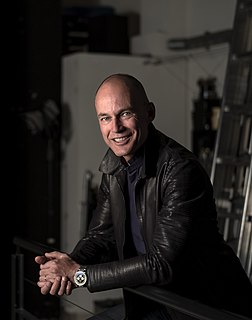A Quote by Niall Ferguson
The debate that I'm interested in having is with seriously smart people about how we design institutions in the 21st century that will genuinely address problems of poverty and educational underachievement.
Related Quotes
We desperately need some new thinking today about systems of global governance. We're stuck with the same obsolete, ignore-the-earth institutions that were brough into being after the 2nd World War, and they're now failing us ever more catastropically. Wild Law shows just how radical we now need to be in creating new institutions that are genuinely 'fit for purpose' in the 21st Century.
I am passionate about what design can do - how far it can support the new ideas and the new ways of living of this 21st Century. Good design accelerates this exciting future where manufacturing is local, materials and processes are cradle to cradle, business models are both socially and financially driven.
The health-care law, irrespective of how people feel about the aims of it - and obviously I don't agree with Obamacare - but the worry that some businesses have about how the law will impact their bottom line has made people more apprehensive about expanding and growing their business in the 21st century.








































